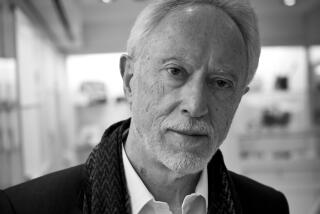FICTION
- Share via
THE SALON IN WURTTEMBERG by Pascal Quignard , translated from the French by Barbara Bray (Grove Weidenfeld: $21.95; 288 pp.) . This novel, which won Pascal Quignard the Guttenberg Prize in France, is a meditation on sensuality, memory and death. It may appeal to readers there as poor man’s Proust, though in fact “The Salon in Wurttemberg” leaves off where “Remembrance of Things Past” begins.
In the early 1960s, serving in the French army, Charles Chenogne and Florent Seinece become friends, despite having little in common. Chenogne is headed for success as a classical musician. Seinece is a scholar whose personality seems to be stitched together out of rituals and obsessions. His bored and beautiful wife, Isabelle, seduces Chenogne. The affair is discovered. The Seineces divorce. Remorse spoils Chenogne’s and Isabelle’s attempt to live together. Years later, after a wrenching reunion, the two men become friends again.
These are the chief emotional events of Chenogne’s life. But later still, when he writes his memoirs in his family’s old home in Germany, he finds that his seemingly meticulous recollections are mere crumbs from the feast of reality, and that the things he does remember are false, or at least can’t be verified by other people. He comes to doubt “whether (any of) it had ever happened. . . . All the past seems like an airy cloud, a strange dream one should never have had.”
This is the condition in which Proust’s narrator finds himself before he eats the madeleine and, in a quasi-mystical way, recaptures the past. It’s also the condition in which Honda finds himself at the end of Yukio Mishima’s “Sea of Fertility” tetralogy--his past and all its meaning dissolving into a Buddhist void.
As for Chenogne, he’s stuck. He has no religion to console him, and he is part of a novel that, while finely written, can’t compare in scope or brilliance to the works of those two masters. He lives--and must die--by his senses, and by a sense of humor that doesn’t seem to translate well. If American lives are fast food, Quignard makes us feel that European lives involve an interminable digestion of linguistic and cultural detail--a heavy meal indeed.
More to Read
Sign up for our Book Club newsletter
Get the latest news, events and more from the Los Angeles Times Book Club, and help us get L.A. reading and talking.
You may occasionally receive promotional content from the Los Angeles Times.






